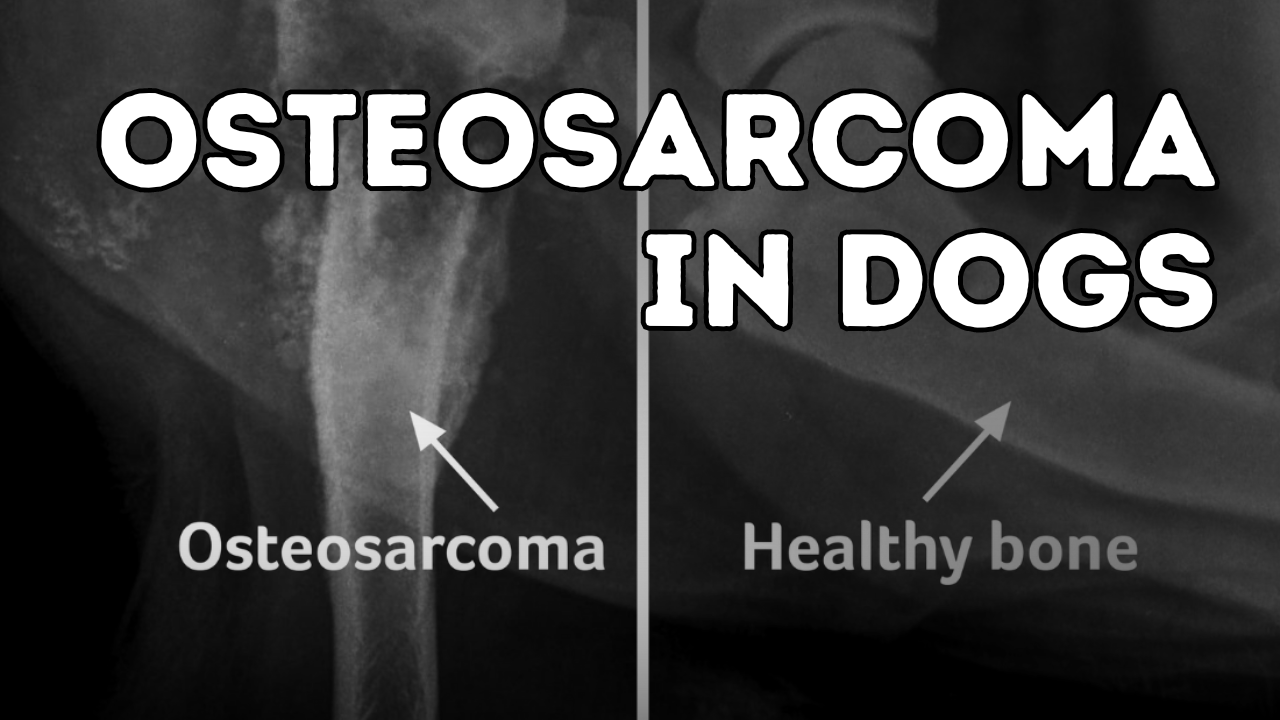New treatment for Bone cancer (osteosarcoma)

Bone Cancer was always one of those cancers that I neverwanted to diagnose in practice… no real good treatment options, and for most dogs it has already spread by the time it is diagnosed.
So prevention is key. What you feed your dog can play a big role in this.
Most of us now know the benefits of supplementing our own, less than ideal diets… well the same thing applies to your dogs.
Your dog on kibble is not getting as many beneficial nutrients that can help support their immune system, preventing serious disease in the first place.
Our supplement,Ultimate Canine ADVANCED Health Formula, has a 10, 000% increase in probiotic levels, additional Antioxidants, 400% more Colostrum, 100% INCREASE in Essential Fatty Acids.


Understanding Osteosarcoma in Dogs
Osteosarcoma is a type of bone cancer primarily affecting medium to large-breed dogs. It commonly targets the bones of the legs. The initial symptom is an intermittent limp that worsens progressively as the tumor expands outward from the bone’s interior. Eventually, you might notice swelling at the bone’s end, which is both firm and painful to the touch.
Veterinary Diagnosis and Staging
To diagnose this condition, your veterinarian will conduct blood tests and X-rays, and potentially a bone biopsy. However, X-rays are typically sufficient for diagnosis.
Treatment with Bisphosphonates
Bisphosphonates, commonly used in human medicine for osteoporosis and high calcium levels in cancer patients, are also applicable in veterinary medicine for bone cancer. These drugs inhibit osteoclasts, which are cells that cause bone breakdown, and they can even destroy bone cancer cells directly, providing significant pain relief. The typical dosage for a large-breed dog might be 40 mg daily or 70 mg every other day. Always discuss this treatment option with your veterinarian to ensure it’s suitable for your dog.
Exploring Alternative Treatments
In addition to traditional treatments, various alternative therapies might be considered. These include Dandelion Root Tea Tincture, Panacur, Turkey Tail Mushroom, Cannabidiol (CBD)/THC, Melatonin, and 95% Curcumin. For high absorption, you can find my specifically formulated 95% Curcumin supplement here.

Innovative Approaches: Immunotherapy Study
A promising development in canine cancer treatment is a new form of immunotherapy being researched by The Canine Cancer Alliance, a non-profit based in Washington State. This study is currently open to dogs diagnosed with osteosarcoma.
EGFR/HER2 Vaccine Study
This novel cancer immunotherapy targets tumors associated with EGFR/HER2 overexpression. The benefits of this treatment include potentially halting or slowing the cancer’s recurrence and spread, offering an alternative when surgery and chemotherapy are ineffective, and possibly reversing cancer metastasis. Over 600 dogs have been treated with minimal side effects reported, showcasing its safety and potential applicability across various cancer types.

Study Enrollment and Locations
Dogs with osteosarcoma can participate in this study at several locations:
- Bridge Animal Referral Center (BARC) in Edmonds, WA. Contact them at (425) 697-2272.
- Washington State University Veterinary Teaching Hospital in Pullman, WA. They can be reached at (509) 335-0711.
- For more information, email info@ccralliance.org.
Challenges and Outlook
Despite these advancements, immunotherapy doesn’t guarantee long-term survival for all dogs, but ongoing research aims to enhance its efficacy and increase responder rates.

Final Thoughts
Osteosarcoma remains a challenging disease with limited treatment options and is often diagnosed after it has already spread. It’s encouraging to see new alternatives emerging. Additionally, for general canine health and potential disease prevention, consider exploring my Ultimate Canine Advanced Health Formula.


Had an x-ray done of my Dane’s leg he’s only just turned three they gave me ideas of what they thought it was osteomyelitis or osteosarcoma never really told me I did a urine test to see if it was fungal osteomyelitis waiting back I have looked at a whole bunch of x-rays to compare he doesn’t have moth eaten design on the X-ray or starburst so I’m not quite sure how they’re seeing osteosarcoma
Osteosarcoma typically shows an aggressive “sunburst” periosteal reaction, Codman triangle, and moth-eaten bone loss on X?rays. Osteomyelitis can mimic these signs, with both showing poorly defined borders and periosteal reaction.
Next best steps:
Urine test (already done) to check for fungal infection.
Ultrasound or CT/MRI to assess soft tissue and bone involvement.
Bone biopsy remains the only definitive way to distinguish between osteosarcoma and osteomyelitis